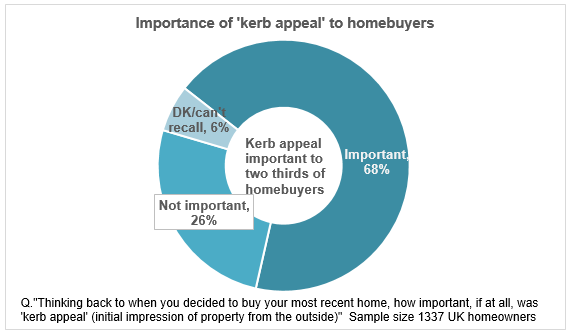Home Front: How to create “kerb appeal” from just £150 to attract buyers and sell for a top price
Federation of Master Builders
5 min read
Kerb appeal matters to two thirds of home buyers, according to a survey by the HomeOwners Alliance.
• Kerb appeal matters to two thirds of home buyers, according to a survey by the HomeOwners Alliance
• Survey reveals the kerb appeal features buyers are looking for – well-maintained windows and a roof in good condition topped the list
• Spending just a few hundred pounds can improve your home’s kerb appeal and positively influence a buyer’s first impression – such as fixing broken tiles on a roof (£190), carrying out a garden tidy up (£150) or improving the front drive or pathway to the house (£100-£500). Estimated costs are provided by the Federation of Master Builders.
More than two thirds (68%) of homeowners say kerb appeal was important in their choice of home. Homeowners have revealed a list of the features most important to them in creating a positive first impression in the home they wanted to buy.
In the HomeOwners Alliance survey, of more than 2,000 UK adults conducted by YouGov, the most important aspects were well-maintained windows and a roof that appeared in good condition. A well-maintained front garden, pathways and fences were also highlighted as important, in addition to a well-painted frontage.
Other significant features included clean gutters, concealed wheelie bins and a brightly-lit exterior. An attractive front door also featured lower down the list.
The HomeOwners Alliance has teamed up with the Federation of Master Builders (FMB) to see how much it would cost to improve these features in your home. The good news is that homeowners can have a tidy front garden from as little as £150, while fixing broken tiles on a roof to make it look top notch can cost as little as £190.
Each of the ten features that contribute to kerb appeal can be delivered for under £2,830 (based on an average three-bedroom house) and could be completed within a week by a small team of tradespeople.
The HomeOwners Alliance survey asked homeowners what kerb appeal features mattered most to them when they bought their home, and found the most important features were as follows. This list also gives indicative costs provided by the FMB to enhance, fix or deliver these kerb appeal features for your home:
• Windows in good condition (71%)
Cost: The FMB say the cost of repairing and redecorating wooden windows that have not been touched for a decade would be between £1,000 and £2,000. For upstairs windows, scaffolding may be required instead of a ladder and, if so, it typically costs £400 a day to rent.
• A roof that appears in good condition (no missing tiles) (68%)
Cost: The FMB say replacing five missing, loose or cracked roof tiles would cost around £190 and would take up to one day. Scaffolding may be needed.
• A tidy front garden with no weeds and trimmed hedges (67%)
Cost: The FMB say the cost of tidying an overgrown front garden would be around £150 for a day’s work.
• A well maintained pathway/drive (59%)
Cost: The FMB say repairing and improving the pathway or drive up to the house could typically cost between £100 and £500 depending on the extent of the damage and the surface.
• Well-maintained fences and walls (56%)
Cost: The FMB say repainting a fence costs about £90 per panel (including labour) while building a new fence could cost up to £1500, depending on the materials used.
• A well-decorated exterior (54%)
Cost: The FMB estimates it would cost around £550 to repaint the front of a house. Scaffolding may be needed.
• A well-maintained and attractive front door (52%)
Cost: Redecorating a front door would typically cost £200, according to the FMB.
• Clear, functioning gutters (50%)
Cost: The FMB say clearing and repairing gutters would cost around £250. Scaffolding may be needed.
• Hidden wheelie bins (36%)
Cost: A natural willow wheelie bin screen storage costs as little as £49.99.
• A well-lit house (26%)
Cost: The FMB say adding an exterior light to the house can cost between £250 and £750 and should be completed by a qualified electrician.
Paula Higgins, Chief Executive of the HomeOwners Alliance, says: “Kerb appeal creates a lasting first impression – most buyers make up their minds in the first few minutes of arriving at a property. So if you’re about to put your home on the market this autumn or your house has been on sale for a while, it’s worth going through this list and seeing what improvements you can make.
“The good news is that a lot of solutions are simple and cost very little, from putting your wheelie bins out of sight, to repainting your front door and weeding your paths. Some jobs don’t even require a tradesperson. But where you do need a professional to help, make sure you get a few quotes before starting work.”
Brian Berry, Chief Executive of the Federation of Master Builders (FMB), says: “That all-important ‘wow factor’ is essential when selling your home. These small jobs can be completed in a matter of days and are guaranteed to help make a property stand out from the crowd.
“However, it’s essential that homeowners work with a reputable and experienced builder to make sure they don’t end up creating more work and expense for themselves in the long run. The last thing you want when trying to sell your home is a messy building site for weeks on end. Always ask around for a recommendation from a friend or family member. If that’s not possible, the Federation of Master Builders free ‘Find a Builder’ service locates independently vetted and inspected, professional builders in your local area.”

